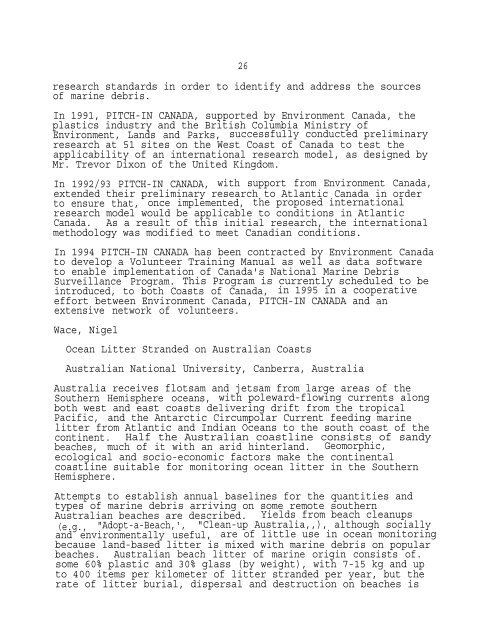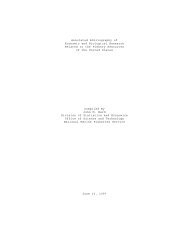Poster abstracts and manuscripts from the Third International ...
Poster abstracts and manuscripts from the Third International ...
Poster abstracts and manuscripts from the Third International ...
Create successful ePaper yourself
Turn your PDF publications into a flip-book with our unique Google optimized e-Paper software.
esearch st<strong>and</strong>ards in order to identify <strong>and</strong> address <strong>the</strong> sources<br />
of marine debris.<br />
26<br />
In 1991, PITCH-IN CANADA, supported by Environment Canada, <strong>the</strong><br />
plastics industry <strong>and</strong> <strong>the</strong> British Columbia Ministry of<br />
Environment, L<strong>and</strong>s <strong>and</strong> Parks, successfully conducted preliminary<br />
research at 51 sites on <strong>the</strong> West Coast of Canada to test <strong>the</strong><br />
applicability of an international research model, as designed by<br />
Mr. Trevor Dixon of <strong>the</strong> United Kingdom.<br />
In 1992/93 PITCH-IN CANADA, with support <strong>from</strong> Environment Canada,<br />
extended <strong>the</strong>ir preliminary research to Atlantic Canada in order<br />
to ensure that, once implemented, <strong>the</strong> proposed international<br />
research model would be applicable to conditions in Atlantic<br />
Canada. As a result of this initial research, <strong>the</strong> international<br />
methodology was modified to meet Canadian conditions.<br />
In 1994 PITCH-IN CANADA has been contracted by Environment Canada<br />
to develop a Volunteer Training Manual as well as data software<br />
to enable implementation of Canada's National Marine Debris<br />
Surveillance Program. This Program is currently scheduled to be<br />
introduced, to both Coasts of Canada, in 1995 in a cooperative<br />
effort between Environment Canada, PITCH-IN CANADA <strong>and</strong> an<br />
extensive network of volunteers.<br />
Wace, Nigel<br />
Ocean Litter Str<strong>and</strong>ed on Australian Coasts<br />
Australian National University, Canberra, Australia<br />
Australia receives flotsam <strong>and</strong> jetsam <strong>from</strong> large areas of <strong>the</strong><br />
Sou<strong>the</strong>rn Hemisphere oceans, with poleward-flowing currents along<br />
both west <strong>and</strong> east coasts delivering drift <strong>from</strong> <strong>the</strong> tropical<br />
Pacific, <strong>and</strong> <strong>the</strong> Antarctic Circumpolar Current feeding marine<br />
litter <strong>from</strong> Atlantic <strong>and</strong> Indian Oceans to <strong>the</strong> south coast of <strong>the</strong><br />
continent. Half <strong>the</strong> Australian coastline consists of s<strong>and</strong>y<br />
beaches, much of it with an arid hinterl<strong>and</strong>. Geomorphic,<br />
ecological <strong>and</strong> socio-economic factors make <strong>the</strong> continental<br />
coastline suitable for monitoring ocean litter in <strong>the</strong> Sou<strong>the</strong>rn<br />
Hemisphere.<br />
Attempts to establish annual baselines for <strong>the</strong> quantities <strong>and</strong><br />
types of marine debris arriving on some remote sou<strong>the</strong>rn<br />
Australian beaches are described. Yields <strong>from</strong> beach cleanups<br />
(e.g., "Adopt-a-Beach,', "Clean-up Australia,,), although socially<br />
<strong>and</strong> environmentally useful, are of little use in ocean monitoring<br />
because l<strong>and</strong>-based litter is mixed with marine debris on popular<br />
beaches. Australian beach litter of marine origin consists of.<br />
some 60% plastic <strong>and</strong> 30% glass (by weight), with 7-15 kg <strong>and</strong> up<br />
to 400 items per kilometer of litter str<strong>and</strong>ed per year, but <strong>the</strong><br />
rate of litter burial, dispersal <strong>and</strong> destruction on beaches is
















